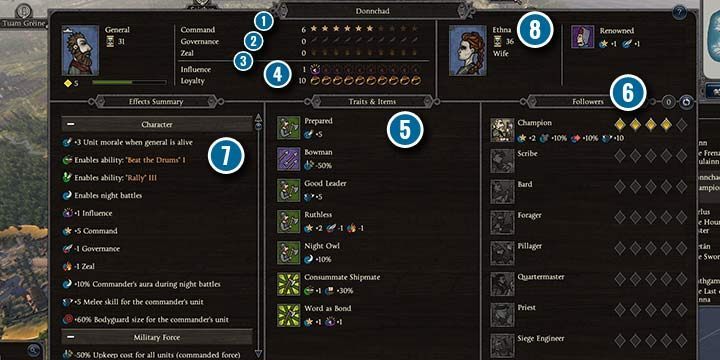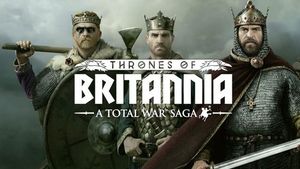Statistics of characters in Total War Saga Thrones of Britannia Total War Saga: Thrones of Britannia Guide & Tips
Last update: 19 June 2018
Every male character in your kingdom is described by a series of coefficients. They affect the ability of the character to manage a province or an army. Some traits improve or diminish relationships with other countries and some influence the recruitment or upkeep costs of units.

The character screen contains a variety of information about the hero's statistics. Here you can see the parameters which describe command (1), governance (2), zeal (3), influence and loyalty (4), additional traits and items (5), followers (the player spends skill points and receives followers) (6), a summary of all effects (7) and information about the character's wife (8).
Command
Command primarily affects the character's ability to lead in battle. The higher the statistic, the easier it is to command the army during each battle, whether on land or sea. Each command point increases the number of soldiers in the general's unit and adds morale points for the entire army when the commander is alive and on the battlefield. What is more, higher levels allow for night attacks and the use of special skills such as "Rally" and "Embolden". A higher command rating also facilitates battles for artificial intelligence, which increases the chances of victory.
Governance
Governance is the most important factor when it comes to administering a province. It is very useful when developing cities. Each governance point reduces construction costs, which makes development much cheaper. When dealing with large and already developed provinces, the second bonus, which reduces corruption, becomes much more important. Corruption has a greater impact on larger realms, and an efficient governor can offset its effects and keep revenues at the right level. At the maximum level of governance, the character gains a +25% income from "market" structures bonus. It is worth considering where to place such a master governor.
Governance is unnecessary for commanders because it doesn't help in battles or on the level of the campaign map in any way.
Zeal
Zeal is a unique modifier that is useful both for governors and commanders. Each point of zeal adds a point of public order to the province. What is more, every active character in the province influences public order. This way, a group of several commanders and a governor can effectively counteract any social unrest in a province (the number of units does not affect this). At the highest level of zeal, the character benefits the kingdom through a small bonus to diplomatic relations with the other factions.
A commander will benefit the most from a high zeal parameter. Each point of zeal increases the range of the commander's aura by 10% and also buffs the morale of nearby units. In addition, morale will also be increased during sieges. If there is no commander in the provincial capital, his role will be taken over by the current governor who will also benefit from this parameter.
Influence and Loyalty
These two features have a large impact on the character's behaviour. Loyalty decides how much a character wants to serve you (the higher the value the better) and influence reflects political power at court. It is also a unique currency for various political actions targeted at members of the court. Ideally, the faction leader should have a high loyalty stat (as well as the successor, since he will inherit the kingdom it is always preferable that he has a lot of points from the very beginning).
Traits and Items
Each character has a set of additional traits. Some of them are acquired during the game, they appear when the character reaches maturity or after recruiting a candidate for a new position. The acquired features will not change, however, the character may gain a number of other additional traits.
Unlike statistics, traits do not only affect parameters but also modify many other values, e.g. they reduce the costs of recruitment or unit maintenance, have impact on public order, income or corruption, Command, morale or combat (bonuses for the general's retinue). You receive some of these traits in a random fashion, but you can influence some of them through the deeds and behaviour of your subject. If you conquer, instead of looting newly acquired territories, you will get the "Conqueror", trait, which will translate into additional public order in the province.
Every male character can have a wife, thanks to which you can modify the statistics of the main character and also change other values ??(e.g. the chance of having children). What is more, the wife will allow you to acquire sons, and thanks to that, you will be able to expand your court.
Followers
Each character gains experience, for which you can purchase special followers. Generals can accelerate this process by participating in battles and emerging victorious. Some structures, events or faction bonuses also accelerate the pace of gaining experience. After earning a certain amount of these points, you can acquire one of several followers who usually affect your statistics and unlock special attributes or bonuses for the character.
